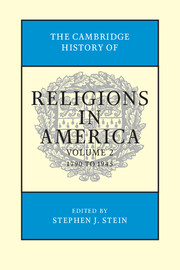Book contents
- Frontmatter
- Contents
- Contributors
- Editor's Introduction
- SECTION I RELIGION IN NORTH AMERICA
- SECTION II RELIGIONS IN THE NEW NATION, 1790–1865
- 5 Religious Organization in the New Nation
- 6 Religious and Geographical Expansion, 1790–1865
- 7 Theological Controversies, 1790–1865
- 8 Religion and Conflict from Independence to the Civil War
- 9 African Americans and the Making of Evangelical Christianities, 1760–1860
- 10 Religion and the Civil War
- SECTION III CHANGING RELIGIOUS REALITIES
- SECTION IV RELIGIOUS RESPONSES TO MODERN LIFE AND THOUGHT
- SECTION V COMPARATIVE ESSAYS
- SECTION VI RELIGION AND DIVERSE AREAS
- Index
- References
5 - Religious Organization in the New Nation
from SECTION II - RELIGIONS IN THE NEW NATION, 1790–1865
Published online by Cambridge University Press: 28 July 2012
- Frontmatter
- Contents
- Contributors
- Editor's Introduction
- SECTION I RELIGION IN NORTH AMERICA
- SECTION II RELIGIONS IN THE NEW NATION, 1790–1865
- 5 Religious Organization in the New Nation
- 6 Religious and Geographical Expansion, 1790–1865
- 7 Theological Controversies, 1790–1865
- 8 Religion and Conflict from Independence to the Civil War
- 9 African Americans and the Making of Evangelical Christianities, 1760–1860
- 10 Religion and the Civil War
- SECTION III CHANGING RELIGIOUS REALITIES
- SECTION IV RELIGIOUS RESPONSES TO MODERN LIFE AND THOUGHT
- SECTION V COMPARATIVE ESSAYS
- SECTION VI RELIGION AND DIVERSE AREAS
- Index
- References
Summary
The new nation would not feature one legally established religion. The First Amendment to the United States Constitution settled that. Neither the Congregational legal establishments in New England, nor the Anglican ones in New York and in the South would be extended nationally. However, as the Constitution could not anticipate the evolution of a robust, ever more populist democracy, institutionalized by two-party politics and governance, neither could Constitution drafters or the new nation's religious leadership foresee that religious freedom would foster
the emergence and evolution of multiple national, purposive, entrepreneurial, missionary denominations;
competing for adherents across the expanding U.S. landscape and to some extent across racial, language, and ethnic lines;
generating single-purpose voluntary societies to underwrite infrastructural and socially transformative measures;
constituting collectively in this denominational order, a religious counterpart to party government and with a similar pattern of major and minor (or marginal) parties;
providing through membership, methodology, and message an American religious citizenship in a commonwealth defined with evocative Protestant images, myths, and concepts (for instance, new Israel, election, covenant, providence, millennium);
tending thereby to tie religious purpose to America as land, nation, society, and people;
and creating as agenda and aspiration an informal Christian establishment with its own political-religious convictions about insiders and outsiders, its expectations for and from elected officials, and its evolving ways of participating in the political process.
- Type
- Chapter
- Information
- The Cambridge History of Religions in America , pp. 91 - 116Publisher: Cambridge University PressPrint publication year: 2000

